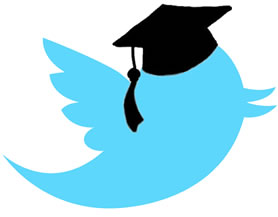From Papyrus to Cyberspace – Looking back to look forward
Once upon a time, as an undergrad my major was history, and for a long time I always imagined I would be a history teacher. While I have taught history classes, I have spent much more time teaching other subjects and now in student services. Despite the changes in how my career has developed, I history still holds an important place in my heart. I say this only to help explain why I very much enjoyed the From Papyrus to Cyberspace podcast. I think it did a wonderful job of showing us how looking back, can help us to look forward.
By looking at how new technologies were perceived in the past the speakers give us a context and a framework for assessing the new technology today. It is made clear that as a society we have always had suspicions about new technology as it emerges, this is defiantly still the case. Both speakers reassure the listener that things are not as extreme as they is often predicted. The reality is normally much more complicated and involves a middle ground with both pros and cons. I would say that as a society we have proven that we collectively agree that the pros out weight the cons. As individuals we might not always concur that the gains of each new technology are worth the losses that come with it. However as a group, we have agreed, otherwise those new technologies would not have taken hold. The automobile example while a bit shocking for me, very clearly shows this contract we have made. As was suggested in the podcast, we have continued to work on reducing the losses, in this case by improving safety of cars, roads, and driving rules. While there are certainly still safety concerns, we would now likely speak about the environmental costs as the biggest lost associated with the privilege of driving. It is a in face a really big cost and while we are (slowly) working on reducing this cost as well, we are still, as a group willing to risk our environment for the gains that comes from driving.
The “New Frontier” metaphor, and the fact that society has been here before both seemed very appropriate and accurate to me. It seems there are several parallels we can take from the past new technology discus to some of the present day technology. One example that came to my mind right away was the way technology can increases professional networking and communication in general. This is true from the printing press all the way to twitter. It was interesting to hear how (at first) not all people liked printing. Printing was seen as something that was not appropriate for important ideas. While I certainly believe in the possibility of using social media tools (like twitter) for professional and educational uses, there are many people who are sceptical of social media in the world of education.
Finally, during the questions period of the podcast there is a reference to “the things you know versus the things you know how to know” This is just as relevant (if not more so) in education today then it was in 1999. As educations it is still our job to make sure students have the basic, but after that it is our responsibility to make sure students know how to learn and how to check the validity of the massive amounts of information available to them. This is obviously not such a new idea if it was being presented 16 years ago. My guess it is in fact even older than that. While many things will change in the next 16 years, I predict that society will still be sceptical of new technology but will ultimately continue to accept the losses in order to benefit from the gains. Moreover it will still be more important to know how to learn then to accumulate large amounts of information.
References:
Engell, J & J. O’Donnell. (1999). From Papyrus to Cyberspace [Audio Podcast]. Retrieved from: https://connect.ubc.ca/webapps/blackboard/execute/displayLearningUnit?course_id=_75468_1&content_id=_2913588_1&framesetWrapped=true.


Yes, I think this notion of the importance for students to know how to learn will become increasingly important in the context of education now and into the future. It gives rise to the importance of critical thinking, and for students to be aware of how they learn, and from what sources they get their information.
It feels like the “medium is the message” and it is leading us like we are the dog on the leash. It makes me wonder how much control we have over new technologies, and how we use them in education. I would like to think I can help my students use technologies in meaningful ways. I’m not sure.
Thanks for your comments about “From Papyrus to Cyberspace” Pamela Morrissey
Thank you for your post Caitilin. You’ll be surprised to know that not everyone liked pencils for example. We have a historical resistance to technological change, apparently. Let me share an interesting piece with you. I think you’ll like it.
I like your take on the podcast here. It was eye opening and I think probably allowed many people to take a step back and realize that we as a society are far to skeptical of any change. I believe this is not only true with technology but with many aspects of our lives. Change is scary and uncertain but not necessarily bad.
As far as using social media in the classroom, I feel at the moment it is a work in progress to ensure we, as teachers, are using it to its full educational potential. And even then, is social responsibility not a part of education today? With our world becoming so diverse in its technologies and ways to cummunicate, it is only prudent to ensure our youth knows how to use these platforms appropriately.
Thank you for the post, definitely thought provoking!